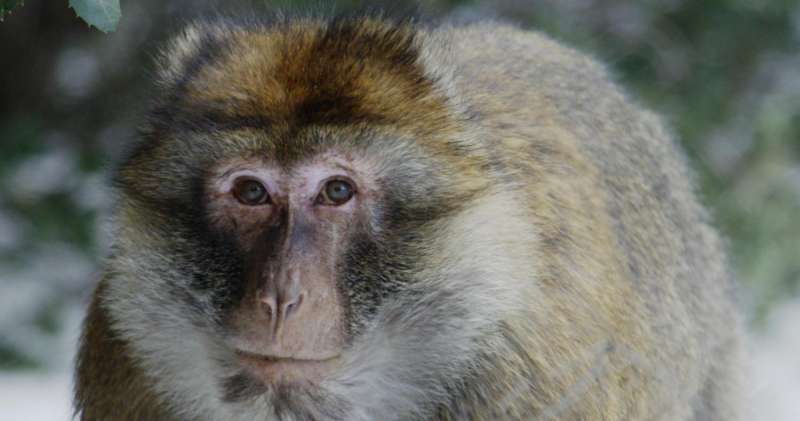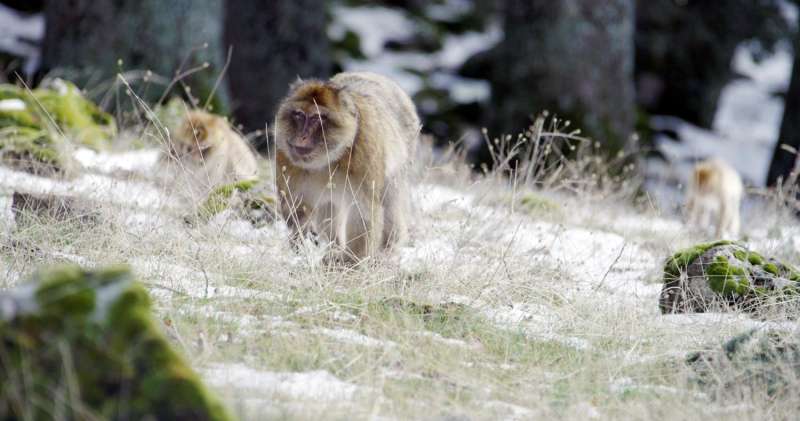Monkeys regulate metabolism to cope with environment and rigours of mating season

New research on male Barbary macaques indicates that these primates have a flexible metabolic physiology, which help them survive by changing the speed of chemical reactions within their bodies, and consequently levels of energy, depending on temperature and availability of food.
The study also suggests that the metabolic rate of male macaques spikes dramatically during mating season, potentially providing a higher "aerobic capacity" at a point when males mate with multiple females a day, as well as fight other males for mating opportunities - on occasion to the death.
Levels of thyroid hormones start to build around a month before mating season, with these metabolism-predicting hormones doubling in some animals at the peak of the season. This is only the second time that changes in metabolic physiology in the run up to mating season have been seen in a vertebrate, the first being in house sparrows.
The natural habitat of Barbary macaques, in the mountains of Morocco and Algeria, is one of the most extreme environments in which any non-human primate lives.
Temperatures in winter drop as low as -5 degrees centigrade, with deep snow covering the ground for months at a time. Summer temperatures can reach 40 degrees, with food and water becoming scarce.
Researchers say that the metabolic flexibility they have observed in macaques may be an echo in one of our primate cousins of a vital physiological mechanism that has allowed humans to adapt to the planet's extreme climates - from Saharan deserts to the Arctic.
"Barbary macaques increase and decrease cellular activity and energy consumption in order to respond to challenges of climate, sustenance and reproduction. In a sense, what happens at a macro level - animal behaviour - is reflected at a micro, cellular level," said lead author Dr Jurgi Cristóbal-Azkarate of Cambridge's Division of Biological Anthropology, who conducted the research with colleagues from the universities of Roehampton and Lincoln.
"Understanding the rules and mechanisms that govern key decisions such as energy allocation in existing primates is important in gaining insight into how our ancestors were able to thrive outside tropical Africa," he said.
"Our knowledge of traits that allowed hominins to adapt to new climatic conditions is practically restricted to those that leave a traceable fossil record. We currently have a very limited understanding of the importance of physiological mechanisms in human evolution. The Barbary macaques in the Atlas Mountains are an ideal model to help address this knowledge gap."

The new findings are published today in the journal Biology Letters.
By collecting faeces dropped by the animals and analysing the samples, the researchers were able to assess levels of the thyroid hormone T3, which is known to provide an indicator of the 'basal' metabolic rate: the amount of energy expended to keep a body at rest.
The thyroid has been shown to affect metabolism across multiple species, including humans, in whom underactive thyroids slow metabolic rates and can cause tiredness, weight gain and depression.
Samples were taken across a nine month period from adult males in two groups - one which has nearly half their food supplied by tourists, and one which has to rely only on the natural diet of foraging for plants and insects.
On average, the monkeys fed by tourists had levels of T3 that were 10% higher, suggesting that those on the natural diet had to conserve energy as well as forage for food. T3 levels also increased the longer animals in both groups had to spend foraging for food. This is in line with other findings in vertebrates showing that they reduce secretion of thyroid hormones to reduce metabolic rates and save energy when "nutritionally stressed".
As the area's climate went through its dramatic seasonal shifts, so too did the macaque metabolism. T3 levels dropped markedly from June to August, then began to rise as mating season approached in the early Autumn. While T3 dropped again after mating season, the levels stayed much higher during the harsh winter months.
"All mammals, and even more so primates, share a common physiology," said Cristóbal-Azkarate. "As with humans, Barbary macaques increase T3 production in winter. Metabolic rates increase in response to lower temperatures as a mechanism to generate more energy and consequently more heat."
Even rain affected T3 and metabolic rates, which increased in wet weather. Researchers say this may show the "high thermoregulatory cost of wet fur".
The effect of the mating season on the macaques' T3 levels, and consequently their metabolic rates, was highly significant. At the height of the season, T3 levels of the males increased by an average of 80% between both groups. The average T3 increase in the wild feeding group was 98%.
"This was an unexpected and interesting finding, suggesting that males boost their metabolism in preparation for the energetic challenges both of mating and of competing with other males for access to females," said Cristóbal-Azkarate.
"Thyroid hormones are essential for sexual development and reproductive function in mammals - there is an important increase in T3 production during puberty, for example.
"To date, studies of male reproductive competition have focused almost exclusively on testosterone and stress hormones. However, our study suggests that there is a new player in the field of male reproductive competition: the thyroid, and metabolic rate."
Added Cristóbal-Azkarate: "This is the first time in which the effects of climate, nutrition and reproductive competition on thyroid hormone physiology have been studied simultaneously, in a naturalistic setting.
"By doing this, we have been able to learn about the way in which the flexibility of the metabolic physiology of Barbary macaques allows these primates - and perhaps other species, including humans - to balance the multiple energetic demands of their harsh and highly variable environment, and cope with ecological and social challenges."
More information: Metabolic strategies in free ranging male Barbary macaques: evidence from faecal measurement of thyroid hormone, Biology Letters, rsbl.royalsocietypublishing.or … .1098/rsbl.2016.0168
Journal information: Biology Letters
Provided by University of Cambridge

















